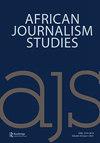Pɔhim Zuɣu: Understanding Indigenous Language News Audiences in Ghana
IF 1.8
3区 文学
Q3 COMMUNICATION
引用次数: 0
Abstract
ABSTRACT Although there is scant audience research in media studies, audiences continue to be key drivers in the political economy of media in Africa and elsewhere. The study explores the dynamics of indigenous language news audiences’ listening habits, how their information-seeking habits are shaped by personal values and the ways in which their participation in civic engagement reinforces their media consumption habits. The study focuses on Dagbanli and Gonja news audiences living in Ghana’s Northern and Savannah Regions. The objective of the study is to explore the way that Dagbanli and Gonja news audiences use the news they receive by parsing out these uses within this sociocultural context. Through in-depth interviews, the listening habits and civic engagements of news audiences are brought to the fore. Through a uses and gratifications approach, I argue that indigenous language news audiences are active agentive consumers whose habits are shaped by contextual factors, personal and social values. The findings of the study demonstrate that the news shapes the political behaviour and voting decisions of audiences. The study also finds that many audiences use the news as an avenue for learning more about education, agriculture, the environment and pervading conversations in the public sphere.祖:了解加纳的土著语言新闻受众
摘要尽管媒体研究中很少对受众进行研究,但受众仍然是非洲和其他地区媒体政治经济的关键驱动力。该研究探讨了土著语言新闻受众的收听习惯的动态,他们的信息寻求习惯是如何由个人价值观塑造的,以及他们参与公民参与如何强化他们的媒体消费习惯。这项研究的重点是生活在加纳北部和萨凡纳地区的Dagbanli和Gonja新闻受众。本研究的目的是通过分析Dagbanli和Gonja新闻受众在这种社会文化背景下使用他们收到的新闻的方式。通过深入的采访,新闻受众的倾听习惯和公民参与被凸显出来。通过使用和满足的方法,我认为土著语言新闻受众是积极的代理消费者,他们的习惯是由语境因素、个人和社会价值观塑造的。研究结果表明,新闻塑造了观众的政治行为和投票决定。研究还发现,许多观众将新闻作为了解更多教育、农业、环境和公共领域广泛对话的途径。
本文章由计算机程序翻译,如有差异,请以英文原文为准。
求助全文
约1分钟内获得全文
求助全文
来源期刊

African Journalism Studies
COMMUNICATION-
CiteScore
1.90
自引率
10.00%
发文量
18
期刊介绍:
Accredited by the South African Department of Higher Education and Training for university research purposes African Journalism Studies subscribes to the Code of Best Practice for Peer Reviewed Scholarly Journals of the Academy of Science of South Africa. African Journalism Studies ( AJS) aims to contribute to the ongoing extension of the theories, methodologies and empirical data to under-researched areas of knowledge production, through its emphasis on African journalism studies within a broader, comparative perspective of the Global South. AJS strives for theoretical diversity and methodological inclusivity, by developing theoretical approaches and making critical interventions in global scholarly debates. The journal''s comparative and interdisciplinary approach is informed by the related fields of cultural and media studies, communication studies, African studies, politics, and sociology. The field of journalism studies is understood broadly, as including the practices, norms, value systems, frameworks of representation, audiences, platforms, industries, theories and power relations that relate to the production, consumption and study of journalism. A wide definition of journalism is used, which extends beyond news and current affairs to include digital and social media, documentary film and narrative non-fiction.
 求助内容:
求助内容: 应助结果提醒方式:
应助结果提醒方式:


